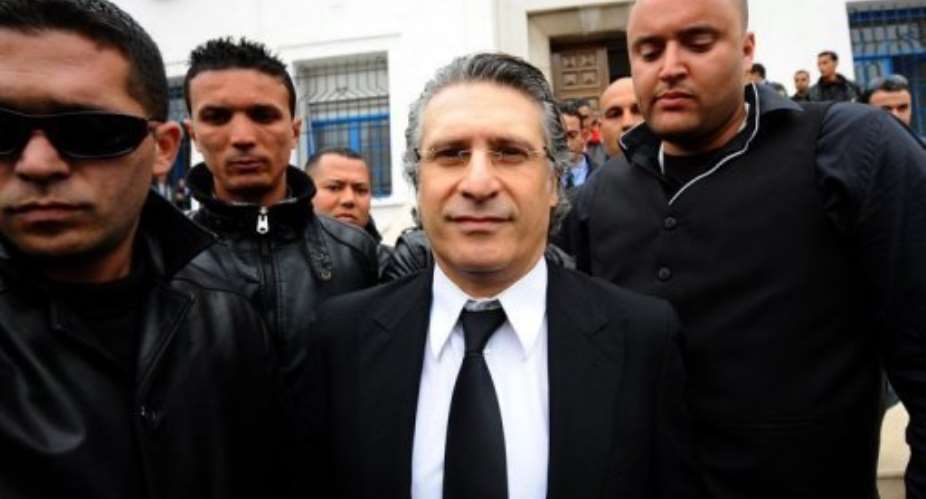TUNIS (AFP) - A Tunisian court on Thursday slapped a small fine on the head of the Nessma television station for undermining morality by screening the film "Persepolis," which included depictions of God.
Nabil Karoui broadcast the award-winning Franco-Iranian film which recounts the Iranian revolution and its aftermath through the eyes of a young girl, on October 7 last year.
The screening prompted attacks on the station's offices and Karoui's home by activists linked to Salafism, a conservative strand of Islam.
In its ruling, the court ordered Karoui to pay 2,400 dinars (1,300 euros, $1,700 dollars) for "broadcasting a film that disturbs public order and threatens proper morals."
A Nessma technician and another station official were both fined 1,200 dinars.
Karoui, who was not in court for the judgement, has described his case as a key test for freedom of expression in Tunisia, which remains in flux following the January 2011 revolution that toppled an entrenched dictatorship and sparked the Arab Spring.
Following a final hearing last month, he said that "the judgment will be historic and will have an effect on the entire region."
The defence said it plans to appeal against the verdict.
"This verdict is an affront to the freedom of the press. We hoped for a straightforward acquittal on this World Press Freedom Day," defence lawyer Abada Kefi told AFP.
"Mr Karoui should have been sentenced to three to six months in prison in light of the charges," prosecution lawyer Rafik Ghak countered, adding he would investigate the option of an appeal.
Several people expressed anger after the announcement of the ruling.
"It's appalling, 2,400 dinars for somebody who made a mockery of God and offended Muslim feelings," said one man, who was in tears.
"People mock Allah and pretend that this is freedom of expression," added a veiled woman outside the courthouse, which was guarded by police.
The trial, which opened in November 2011 and was twice postponed, roused strong feelings pitting those who argued for freedom of expression against violent extremist Muslims.
Tunisia is now led by the moderate Islamist Ennahda party that won the most seats in October elections, the first polls since ex-president Zine El Abidine Ben Ali was toppled.
Reporters Without Borders (RSF) said that the choice of Press Freedom Day for a hearing was no coincidence and gave the authorities the chance for a "positive image". The media watchdog had asked for the charges to be dropped and called on the judiciary to cease trying such cases on the basis of repressive laws dating from Ben Ali's era.
Amnesty International and the International Federation for Human Rights both monitored the trial.





 There’s nothing you can do for us; just give us electricity to save our collapsi...
There’s nothing you can do for us; just give us electricity to save our collapsi...
 Ghanaian media failing in watchdog duties — Sulemana Braimah
Ghanaian media failing in watchdog duties — Sulemana Braimah
 On any scale, Mahama can't match Bawumia — NPP Youth Organiser
On any scale, Mahama can't match Bawumia — NPP Youth Organiser
 Never tag me as an NPP pastor; I'm 'pained' the 'Akyem Mafia' are still in charg...
Never tag me as an NPP pastor; I'm 'pained' the 'Akyem Mafia' are still in charg...
 Your refusal to dedicate a project to Atta Mills means you never loved him — Kok...
Your refusal to dedicate a project to Atta Mills means you never loved him — Kok...
 2024 elections: I'm competent, not just a dreamer; vote for me — Alan
2024 elections: I'm competent, not just a dreamer; vote for me — Alan
 2024 elections: Forget NPP, NDC; I've the Holy Spirit backing me and nothing wil...
2024 elections: Forget NPP, NDC; I've the Holy Spirit backing me and nothing wil...
 2024 elections: We've no trust in judiciary; we'll ensure ballots are well secur...
2024 elections: We've no trust in judiciary; we'll ensure ballots are well secur...
 Performance tracker: Fire MCEs, DCEs who document Mahama's projects; they're not...
Performance tracker: Fire MCEs, DCEs who document Mahama's projects; they're not...
 Train crash: Railway ministry shares footage of incident
Train crash: Railway ministry shares footage of incident
